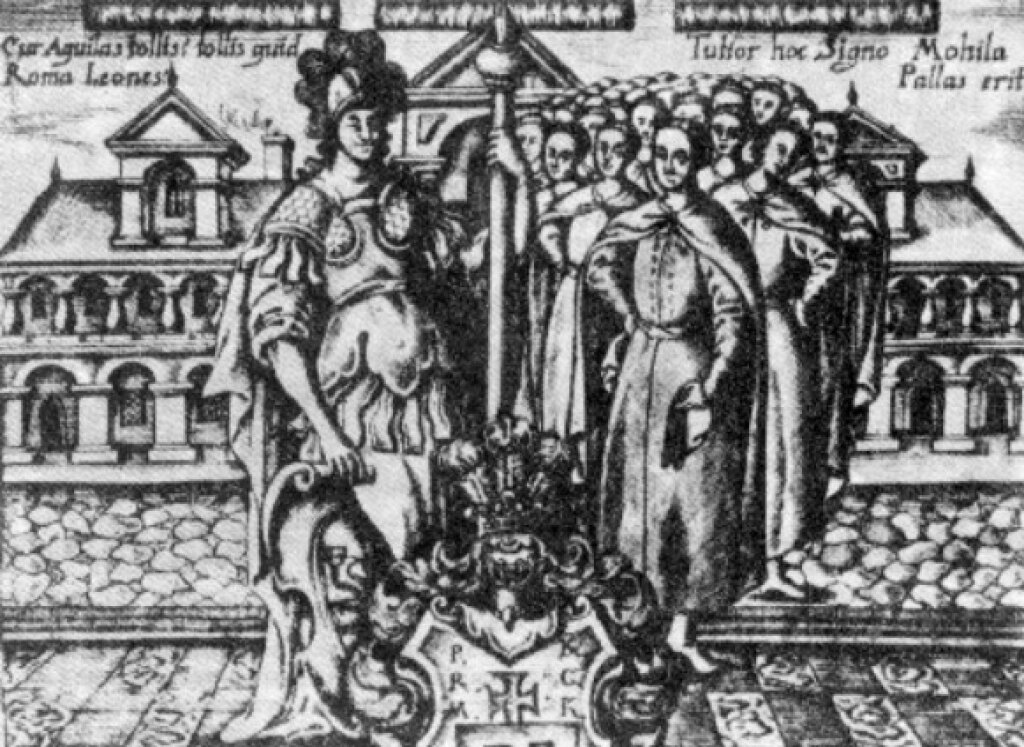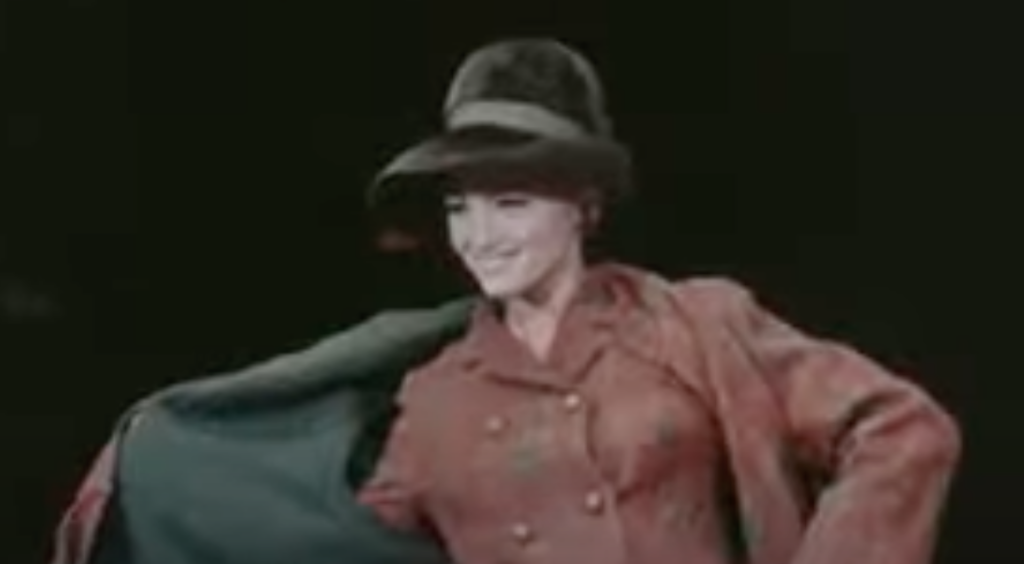The Jordan Center stands with all the people of Ukraine, Russia, and the rest of the world who oppose the Russian invasion of Ukraine. See our statement here.
This post was a Judges' Choice winner in the Jordan Center Blog's third Graduate Student Essay Competition.
Above: Ivan Shchyrsky, "Students of Kyivan Mohyla Academy" (1701). Source
Reut Ullman is a doctoral candidate in History at Columbia University. Her research focuses on the intersection of philosophy, science, and politics in Elizabethan Russia.
Musing on the absence of a learned culture in Orthodox Rus' as late as 1577, Polish hagiographer Piotr Skarga (1536-1612) bitingly concluded:
with the Slavonic tongue one cannot be a scholar. It has neither grammar nor rhetoric, nor can it be given any. Because of this language, the Orthodox have no schools beyond the elementary which teach reading and writing. Hence their general ignorance and confusion.
Though Skarga was recapitulating a cliché fashionable among his Polish contemporaries, there was a grain of truth to his complaint. The first institution of higher learning offering a liberal arts curriculum that catered to Orthodox Slavs was founded only in 1637 in Kyiv, then under the control of the Polish-Lithuanian Commonwealth. Within a decade, however, the Kyiv-Mohyla Academy attained a reputation for scholarly rigor that caught the ear of Russian Tsar Alexei Mikhailovich (1629-1676), who began inviting Academy graduates to fill the bureaucratic ranks of the Muscovite realm. In 1685, a similarly styled institution was founded on Muscovite soil.
Both academies modeled a traditional Jesuit curriculum modified for Orthodox Christian consumption and administered by Orthodox clerics. In the eighteenth century, dozens of such institutions peppered the Russian Empire. By the mid-nineteenth century, according to scholars of religion Scott Kenworthy and Alexander Agadjanian, the Russian clerical estate was among the best-educated estates in the land.
If the first liberal arts academies in East Slavic lands swiftly attained a reputation for academic excellence, and were endorsed by both Church and state authorities, why was their introduction stalled until the seventeenth century?
Scholars have offered a host of causes for the "intellectual silence" that enveloped Rus' lands. Past explanations have included the Great Schism of 1054, which severed the Orthodox East from the Latin intellectual networks; the balkanization of Rus' lands, which rendered each principality too small to host a secular culture, to the remoteness of Rus' lands from intellectual centers of Europe; the 300-year Mongol occupation, which laid waste to libraries and monasteries; and finally, the persistent intolerance to "foreign" learning by the Russian Orthodox Church.
Each analysis has some merit, yet one understudied area is the exclusion of the theological corpus of St. Augustine of Hippo from the Russian theological canon. Augustinian thought had helped define postlapsarian epistemology and crystallize Christian doctrine on sin, grace, and church-state relations in the Latin West. Among Augustine’s less-cited, but no less critical, accomplishments was the promotion of the liberal arts.
In the fourth-century text De Ordine, Augustine cogitated at length on the study of the liberal arts, along with their application to the pursuit of the highest forms of intelligible reality: the knowledge of the soul and God. He reasoned that the liberal arts were potent tools to discipline the mind against the chimeras of sense perception, for “[man] needs the great habit of withdrawing from the senses and of collecting his soul into itself and holding itself there." Scholars of the liberal arts, Augustine suggested, can "reach such a stage" that they are able to "heal by the liberal disciplines certain wounds of opinion that the course of daily life inflicts.” (1.1.3)
In the same dialogue, Augustine also argued that it was possible to attain earthly happiness primarily through the intellect, meaning it would be accessible only to the select few schooled in the liberal arts:
And lest someone imagine that we have embraced something too extensive, I say this more plainly and briefly: no one ought to aspire to the knowledge of those things [i.e., the divine order] without that double science, so to speak, of good disputation and the power of numbers…
A double question belongs to this education: one about the soul, the other about God. The first makes it so that we know ourselves; the other, our origin. The former is sweeter to us; the latter, more precious. The former makes us worthy of a happy life; the latter makes us happy. (2.18.47)
In his later writings, Augustine would soften his views on the earthly fate of the uneducated but devoutly faithful. Such modifications, however, did not stir the intellectual inheritors of his tradition, from Thomas Aquinas to Gottfried Leibniz.
In contrast to the Augustinian iteration of Latin doctrine, Greek Orthodoxy and especially Russian Orthodoxy emphasized material, experiential, visceral worship. Through such encounters, believers could attain an intimate knowledge of God, experience the divine, and become deified in the process.
The emphasis on ritual bodily worship was apparent in the very etymology of the Greek term “orthodox” and its Russian equivalent, pravoslavie, as well as in the Orthodox approach to theology. The term “orthodox” derives from the Greek orthos for correct and doxa for glory. Similarly, pravoslavie is a compound of two words, pravo for correct and slava for glory. The Orthodox faith is thus the correct way to glorify God, with the emphasis of the faith on the worship rather than on rational apprehension of the divine.
Thus, Eastern Orthodox theologians seldom engaged in scholarly attempts to rationalize Christian doctrine. Indeed, according to Kenworthy and Agadjanian, such efforts would have amounted to "a reduction of theology to a rational, philosophical system.” Instead, Orthodox theologians “believe[d] that the mystery of God ultimately transcend[ed] human reason and the systems it construct[ed].” These sentiments echo in the writings of the Russian theologian Pavel Florensky, who argued that to encounter the divine was to physically immerse oneself in its pursuit. "Orthodoxy," wrote Florensky, "is shown, not proved. That is why there is only one way to understand Orthodoxy: through direct Orthodox experience.”
Thus, while for Augustine, the pathway to earthly salvation or happiness was rational, for Greek church fathers it was ontological. It was also for this reason that the study of nature in the Latin West embodied a higher plane of knowledge than in the lands of Rus’, for to uncover the eternal laws of God’s universe was analogous to encountering and glorifying the divine.
Because the path to salvation within the Orthodox rite was performative rather than intellectual, there was no impetus to introduce the study of the liberal arts into East Slavic lands. The hurried founding of the Kyiv-Mohyla Academy was spurred by existential circumstances. The Orthodox confession had suffered significant losses in traditionally Orthodox territories with the rise of the Uniate Church in 1596 under King Sigismund III of Poland (1566-1632). A militant Roman Catholic, Sigismund sought to bring all Orthodox believers in his kingdom into the Catholic fold. To stave off the Catholic assault on Orthodoxy, Kyiv Metropolitan Piotr Mohyla founded the Academy on the Jesuit scholastic model to arm Orthodox theologians with weapons of rhetoric, logic, and dialectical method of analysis.
Similarly, the Moscow Slavo-Greco-Latin Academy (1685) was founded out of political and administrative exigency. Patriarch Nikon’s reforms had created a schism within the Church hierarchy and laity. To mitigate a potentially explosive social rift, the Russian Orthodox Church needed to train a new cadre of clerics sympathetic to the new reforms. Meanwhile, the tsar’s bureaucracy routinely lacked competent bureaucrats. The founding of the Moscow Academy under the aegis of the Leichoudes brothers provided a timely solution to both problems.
The Russian Orthodox Church administered the intellectual culture of the Muscovite realm in the early modern period. The absence of theological reverence for the study of the liberal arts, coupled with the unchallenged hegemony of the Orthodox rite in the East Slavic lands for most of the early modern period, made the study of the liberal arts superfluous until the seventeenth century.



